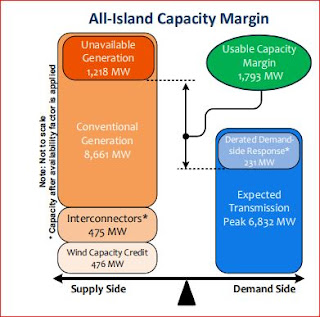During the 1970s, when the last serious energy crisis occurred, the Irish government and ESB, free from almost any ideological constraints, drew up plans for the single largest construction undertaking in the history of Ireland - Moneypoint coal power station. It was a huge success and the power station is still managing to keep the lights on during the current energy crisis despite being a target for destruction by the ideologues that swarm Leinster House today.
Ideologue - various definitions given :
The roots of the modern ideological movement began back then in the anti- nuclear movement. It could be argued that man has a natural aversion to nuclear power arising from fear of the unknown. It is of course still a relatively modern technology. But man has no natural aversion to coal. Indeed, the inhabitants of Ireland have been burning coal for thousands of years. In the 1770s, an ancient coal mine was discovered in Antrim. The antique mining tools found there disintegrated as soon as they were touched. It is only very recently in human history and after years of relentless propaganda that man has decided he wants to turn his back on coal even though it is proving more difficult than he first thought.
It is not so much misinformation that is causing an unnatural fear of coal, but lack of balance and maturity in the judgement of those at the driving seat of the new ideology. For example, eating your lunch carries with it the risk of choking, but we all accept that risk for the benefits associated with satisfying your hunger. However, if we were to just focus on the negatives and ignore any positives, then the risk of choking is no longer acceptable and therefore eating must be outlawed as an antiquated pastime no longer acceptable in a modern progressive society. Afterall, choking is one of the leading causes of unintentional deaths every year.
So this is the big difference between the 1970s and the 2020s - for ideological reasons we can't build another Moneypoint power station. Nuclear was ruled out then and is still ruled out now. Let's add coal to the black list. What can go wrong ?
This leaves us with gas power. But surely it would be foolish to build more gas power stations when high gas prices and the uncertainty of gas supply are the root causes of the current energy crisis ? For the ideologues who become increasingly divorced from reality, this is not a problem. Gas is good, at least for now (except of course if it's LNG / Liquified Gas that can be shipped in in an emergency situation where the UK can't supply piped gas), coal is bad goes the diktat and the economists and media pundits, one after the other, fall in line. But for the gas generators contracted to build the new power stations, reality is not something they can ignore, and they are pulling out of the Irish market, one after the other.
Since energy production is a long term enterprise (Moneypoint wasnt up and running until the mid-1980s) and involves engineering expertise, Governments can't magic power plants out of thin air after a crisis emerges. The sensible reaction to the 1970s crisis paved the way for a stable energy sector which enabled the economic growth of the 1990s and 2000s. But did this cheap reliable electricity that we all took for granted back then create a false sense of security? You flick the switch and the lights automatically come on. The switch from one form of power generation with chimneys and stacks and emissions could seamlessly be made to another with turning blades and no emissions. You flick the switch and the lights automatically come on or will they ?






